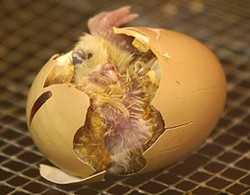[
{
"name": "Top Stories Video Pair",
"insertPoint": "7",
"component": "17087298",
"parentWrapperClass": "fdn-ads-inline-content-block",
"requiredCountToDisplay": "1"
}
]
Why is there something rather than nothing? That question — pioneering psychologist William James dubbed it "the darkest in all philosophy" — feels to me a bit like "what's north of the North Pole?" It's a trick question because of its insinuation that an explanation is called for because "nothing" is normal and "something" demands a justification. But why? The usual answer is that nothing is more symmetrical and less arbitrary, in a word simpler, than any something you can come up with.
But from a gambler's point of view, nothing's very simplicity would make is less likely, not more! There are many, many ways of being something (worlds with the consistency of toothpaste, humans who age in reverse, a universe composed entirely of tequila ...), but only one way of being nothing. So in a cosmic lottery, it's highly unlikely you'd end up with nothing. The odds vastly favor something. Q.E.D.
Not convinced? (Me either.)
OK, how's this: Maybe there once was nothing, but it became something at the moment of the Big Bang 13.7 billion years ago (see Field Notes 7/5/2012). That's the nutty idea advanced in last year's bait-and-switch bestseller by cosmologist Lawrence Krauss, A Universe from Nothing. His nothing is a quantum vacuum (got that?), bustling with quantum fluctuations, not to mention a boatload of laws to support such goings-on. Sounds to me more like Second Street on an Arts Alive Saturday night than nothing. Indeed, the very phrase "Big Bang" underlines the absurdity of a pre-existing nothing. The late British astronomer Fred Hoyle, who sarcastically invented the phrase over 60 years ago in a BBC interview, thought the whole something-from-nothing idea "rather undignified, like a party girl jumping out of a cake."
Yet this universe ex nihilo, out of nothing, is what passes these days for sublime cosmological thinking. For instance, Alexander Vilenkin, director of the Tufts University Institute of Cosmology, invites us to picture a bubble forming in a glass of champagne — then to subtract the champagne. In this view, nothing doesn't stand a chance; it's unstable, it has to give way to something.
Four hundred years ago, the Flemish chemist Jan Baptist van Helmont claimed that mice would be created naturally and spontaneously if you left a scrap of dirty cloth with a few grains of wheat for 21 days in the corner of your room. He was following a long tradition of "spontaneous generation" from Aristotle on down, suggesting that living organisms spontaneously spawned themselves, absent descent from similar organisms: Fleas came from dust, maggots from rotting meat. Seems to me, the current crop of "universe from nothing" proposals have murky parallels with these long-discredited "life from nothing" theories. You don't have to be a cosmologist, physicist or anything-ist to see the inherent problem in all of this giddy "spontaneous universe" speculation: Any theory of how the universe came into being has to include the theory itself — which has to include itself, ad infinitum.
And once you get into infinite regression, you don't have a theory. You have dust in the wind.
Barry Evans ([email protected]) never quite got over the childhood experience of seeing his multiple selves disappear into infinity in a pair of fairground mirrors.
Comments
Showing 1-1 of 1
more from the author
-
A Brief History of Dildos
- Apr 11, 2024
-
Eclipse!
- Mar 28, 2024
-
The Little Drone that Could
- Mar 14, 2024
- More »
Latest in Field Notes
Readers also liked…
-
Trouble on the Line: The Reality Part 2
- Nov 3, 2022


































